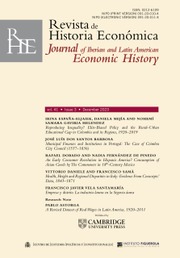Article contents
THE ALLIED NEUTRAL? PORTUGUESE BALANCE OF PAYMENTS WITH THE UK AND GERMANY IN THE SECOND WORLD WAR, 1939-1945
Published online by Cambridge University Press: 09 January 2020
Abstract
In September 1939, Portugal made a realist strategic choice to preserve the Portuguese Empire maintaining by its neutrality and also remaining an ally of Great Britain. While the Portuguese could rely largely on their colonies for raw materials to sustain the mainland, the country had long depended on British transportation for these goods and the Portuguese military. With the British priority now given to war transportation, Portugal's economy and Empire were particularly vulnerable. The Portuguese dictator Antonio Salazar sought to mitigate this damage by maintaining particularly friendly financial relations with the British government, including increased exports of Portuguese merchandise and services and permission to accumulate credits in Sterling to cover deficits in the balance of payments. This paper gives an improved set of comprehensive statistics for the Anglo-Portuguese and German–Portuguese relationships, reported in Pounds and according to international standards. The reported statistics include the trade in merchandise, services, capital flows, loans and third-party transfers of funds in favour of the British account. When compared with the German statistics, the Anglo-Portuguese figures show the Portuguese government favoured the British in financial relations, an active choice by Salazar to maintain the Portuguese Empire.
Resumen
En septiembre de 1939 Portugal optó por una estrategia realista para preservar el imperio portugués: mantener su neutralidad y seguir siendo también un país aliado de Gran Bretaña. La metrópoli portuguesa podía mantenerse gracias a las materias primas de sus colonias, pero dependía en gran medida de los medios de transporte británicos, tanto para el transporte de estos productos como el de las fuerzas armadas portuguesas. Al pasar a ser el transporte bélico la opción prioritaria británica en 1939, quedaron especialmente al descubierto las vulnerabilidades de la economía de Portugal y de su imperio. El dictador portugués Antonio Salazar trató de mitigar los daños manteniendo relaciones financieras particularmente amistosas con el gobierno británico, incluido el aumento de las exportaciones de productos y servicios portugueses, y la acumulación de créditos en libras esterlinas para cubrir los déficits en la balanza de pagos. Este artículo presenta un conjunto más completo y pormenorizado de estadísticas sobre las relaciones anglo-portuguesas y germano-portuguesas. Las estadísticas, basadas en libras esterlinas y elaboradas de acuerdo con estándares internacionales, se refieren al comercio de mercancías, servicios, flujos de capital, préstamos y transferencias de fondos de terceros a favor de la cuenta británica. En comparación con las estadísticas alemanas, las cifras anglo-portuguesas demuestran que el gobierno portugués favoreció a los británicos en las relaciones financieras, una opción activamente adoptada por Salazar para preservar el imperio portugués.
Keywords
- Type
- Articles/Artículos
- Information
- Copyright
- Copyright © Instituto Figuerola, Universidad Carlos III de Madrid, 2020
Footnotes
Senior Teaching Fellow and Deputy Head of Economics. [email protected]
References
REFERENCES
- 3
- Cited by


